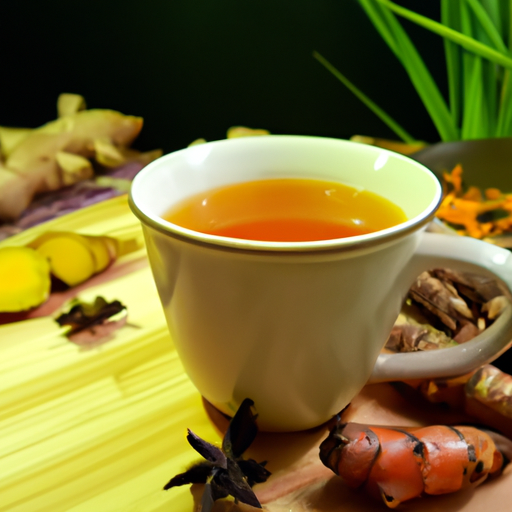I have always been a tea enthusiast, and recently, I have been trying out various types to determine which ones offer the greatest health benefits. One particular tea that has piqued my interest is ginger turmeric tea. It not only has a delicious flavor but also provides multiple health advantages supported by scientific research.
Ginger and turmeric are both well-known for their anti-inflammatory and antioxidant properties. When combined in tea form, they create a powerful beverage that can help reduce inflammation throughout the body, boost immunity, aid digestion, improve heart health, enhance brain function and even benefit skin health.
In this article, we will explore each of these benefits in more detail and discuss how you can make ginger turmeric tea at home to reap its rewards.
Key Takeaways
- Ginger turmeric tea is a powerful anti-inflammatory and antioxidant drink that can help reduce inflammation throughout the body, boost immunity, aid digestion, and improve heart health.
- It also has neuroprotective effects on the brain, can benefit skin health by reducing inflammation and promoting healthy skin from the inside out, and may help prevent chronic diseases such as cancer, heart disease, and Alzheimer’s.
- When making ginger turmeric tea, it’s important to use fresh ginger root and fresh or ground turmeric, and honey can be added for sweetness if desired.
- However, precautions should be taken as ginger and turmeric can interact with certain medications and cause negative side effects, and too much of either herb can have adverse effects on blood pressure, blood sugar levels, or bleeding disorders. It’s always important to consult a healthcare provider before adding new foods to your diet.
Antioxidant Properties of Ginger and Turmeric
I’ve been reading up on the antioxidant properties of ginger and turmeric, and I’m excited to share what I’ve learned. These two spices have been found to have a significant role in preventing chronic diseases, such as heart disease and cancer.
Additionally, they can boost our immune systems by reducing inflammation and fighting off harmful free radicals. So if you’re looking for a natural way to improve your health, consider incorporating ginger turmeric tea into your daily routine!
Role in Preventing Chronic Diseases
Combining ginger and turmeric in tea can provide a natural way to prevent chronic diseases such as cancer, heart disease, and Alzheimer’s. The prevalence rates of these conditions are increasing worldwide, and prevention strategies are becoming more important than ever before.
Ginger and turmeric contain powerful antioxidants that neutralize free radicals in the body, reducing oxidative stress that can lead to chronic inflammation and disease. Studies have shown that ginger and turmeric have anti-inflammatory effects that may help reduce the risk of developing chronic diseases.
Curcumin, the active ingredient in turmeric, has been found to inhibit tumor growth in animal studies. Ginger has also been shown to have anti-cancer properties by inducing cell death in cancer cells. Incorporating ginger and turmeric into your daily routine by drinking their tea can be an effective way to prevent chronic diseases naturally.
In addition to preventing chronic diseases, these spices also play a significant role in boosting immunity.
Role in Boosting Immunity
It’s ironic that many people reach for synthetic supplements to boost their immunity when they could simply incorporate two common kitchen spices into their diet. Ginger and turmeric are natural remedies that have been used for centuries in Ayurvedic and traditional medicine to enhance the body’s immune response.
Here are three reasons why these immunity boosters should be a part of your daily routine:
- They contain powerful antioxidants that help fight off harmful free radicals, reducing the risk of chronic diseases.
- They have anti-inflammatory properties that can reduce inflammation in the body, which can weaken the immune system over time.
- They stimulate the production of white blood cells, which are crucial for fighting infections and diseases.
By incorporating ginger and turmeric into your diet, you can give your body the natural boost it needs to fight off illnesses and stay healthy. In addition to boosting immunity, these spices also possess anti-inflammatory properties that can alleviate pain and decrease swelling. We’ll explore this further in the next section on ‘anti-inflammatory properties of ginger and turmeric’.
Anti-Inflammatory Properties of Ginger and Turmeric
You’ll be happy to know that ginger and turmeric both have powerful anti-inflammatory properties, which can help reduce inflammation and pain in your body. The active compound in ginger, called gingerol, has been found to inhibit the production of cytokines, which are inflammatory molecules produced by our immune cells.
Turmeric also contains a potent anti-inflammatory compound called curcumin, which has been shown to be effective in reducing inflammation in conditions such as arthritis.
To reap the benefits of these two powerful ingredients, you can try making ginger turmeric tea at home. There are many recipes and variations available online, but a simple one involves steeping fresh grated ginger and turmeric root in hot water for 5-10 minutes before straining and drinking. Adding lemon juice or honey can also provide additional health benefits while enhancing the flavor of the tea.
Now let’s move on to the next section about digestive benefits of ginger and turmeric.
Digestive Benefits of Ginger and Turmeric
Digestive issues can be alleviated with the consumption of ginger and turmeric due to their natural properties. Ginger has been found to stimulate digestion by increasing the production of digestive enzymes, while turmeric helps to reduce inflammation in the gastrointestinal tract. This combination can help alleviate symptoms of indigestion, bloating, and gas.
Furthermore, both ginger and turmeric have a long history of culinary uses for digestive health. In traditional cooking practices, these two ingredients are often used in dishes that are difficult to digest or heavy on the stomach. The addition of ginger and turmeric not only adds flavor but also aids in digestion.
Incorporating ginger and turmeric into your diet through tea or meals may provide relief from digestive discomforts while promoting overall gut health. In addition to their digestive benefits, ginger and turmeric also offer cardiovascular benefits which will be discussed in the subsequent section about their properties.
Cardiovascular Benefits of Ginger and Turmeric
Get ready to boost your heart health with the natural power of ginger and turmeric! These two spices have been used for centuries in traditional medicine for their numerous health benefits, including their impact on heart health and blood circulation. Recent research has shed light on how ginger and turmeric can help improve cardiovascular function by regulating blood pressure and cholesterol levels.
Studies have shown that ginger can lower blood pressure by acting as a vasodilator, which means it helps widen the blood vessels, allowing for smoother blood flow. Additionally, its anti-inflammatory properties can reduce inflammation in the arteries, reducing the risk of plaque buildup and improving overall cardiovascular health. Turmeric, on the other hand, has been found to decrease LDL (bad) cholesterol levels while increasing HDL (good) cholesterol levels. This balancing effect on cholesterol levels is crucial in maintaining healthy arteries and preventing heart disease. Incorporating ginger and turmeric into your diet through a delicious cup of tea can provide these benefits without any harmful side effects commonly associated with pharmaceutical interventions.
Now let’s move on to exploring the brain benefits of ginger and turmeric!
Brain Benefits of Ginger and Turmeric
Your brain is a powerful machine, and adding the natural fuel of ginger and turmeric to your diet can give it an extra boost. Both of these spices contain compounds that may have neuroprotective effects on the brain.
For example, ginger contains gingerol, which has been shown to reduce inflammation in the brain and increase levels of a protein called brain-derived neurotrophic factor (BDNF), which is important for maintaining healthy neurons.
Turmeric, on the other hand, contains a compound called curcumin, which has been found to have cognitive benefits. Curcumin may improve memory and attention span by increasing levels of a hormone called Brain-Derived Neurotrophic Factor (BDNF). Additionally, curcumin may also help protect against age-related cognitive decline by reducing oxidative damage and inflammation in the brain.
Incorporating ginger and turmeric into your diet could potentially give your brain an extra boost in both the short-term and long-term.
As we move onto discussing skin benefits of ginger and turmeric, it’s important to note that their positive effects aren’t just limited to their internal health benefits.
Skin Benefits of Ginger and Turmeric
I personally love incorporating ginger and turmeric into my diet for their skin benefits. These spices have been shown to improve overall skin health by reducing inflammation and promoting circulation.
Additionally, they may be helpful in treating specific skin conditions such as acne, eczema, and psoriasis due to their anti-inflammatory properties.
Role in Improving Skin Health
By incorporating ginger turmeric tea into your daily routine, you may notice a significant improvement in the overall health and appearance of your skin. Both ginger and turmeric are natural remedies that have been used for centuries to improve various aspects of health, including skin health.
These ingredients contain anti-inflammatory properties that can help reduce inflammation in the body, which is often linked to skin irritation and acne. In addition to their anti-inflammatory benefits, both ginger and turmeric also contain antioxidants that can help protect against free radical damage.
Free radicals are unstable molecules that can cause damage to cells, leading to premature aging and other skin conditions such as hyperpigmentation. By incorporating ginger turmeric tea into your daily skincare routine or using DIY skincare products containing these ingredients, you can help promote healthy skin from the inside out. This makes it an excellent addition to any beauty regimen.
In the next section, we will explore how ginger turmeric tea plays a role in treating specific skin conditions.
Role in Treating Skin Conditions
As we’ve discussed previously, ginger turmeric tea can work wonders in improving the overall health of your skin. However, it doesn’t stop there – this amazing beverage also has a significant role in treating various skin conditions such as acne and reducing inflammation.
If you’re someone who struggles with acne-prone skin, sipping on a cup of ginger turmeric tea may be just what you need. Both ginger and turmeric contain potent anti-inflammatory properties that help to reduce redness and swelling associated with acne breakouts. Additionally, these spices can also help to fight off harmful bacteria on the skin’s surface, preventing future breakouts from occurring.
Here are some other ways that drinking ginger turmeric tea can benefit your skin:
-
It helps to boost circulation, which can result in a healthier-looking complexion
-
The antioxidants found in both ginger and turmeric can protect against environmental stressors that damage the skin
-
Ginger contains natural oils that act as an antiseptic agent, helping to keep pores clean and clear
-
Turmeric is known for its ability to brighten dull skin by promoting cell turnover
-
The anti-inflammatory properties found in both spices can help to soothe irritated or sensitive skin
Now that we know all about the benefits of drinking ginger turmeric tea for our skin, let’s move onto how we can make this delicious beverage at home.
How to Make Ginger Turmeric Tea
I’m excited to share with you how I make my favorite ginger turmeric tea!
To start, you’ll need fresh ginger root, fresh or ground turmeric, honey (optional), and water.
The step-by-step instructions are easy to follow and the result is a deliciously fragrant and healthy beverage that can be enjoyed any time of the day.
Ingredients Needed
You’ll need just a few things to brew up a delicious cup of this golden elixir – ginger, turmeric, water, honey and lemon. These ingredients work together to create a warming and flavorful tea that offers numerous health benefits. Ginger is known for its anti-inflammatory properties and can help alleviate nausea, while turmeric contains curcumin, which has been shown to have antioxidant and anti-inflammatory effects.
To make the perfect cup of ginger turmeric tea, it’s essential to use fresh ingredients. When choosing ginger root, look for pieces that are firm and free from wrinkles or soft spots. Turmeric should be bright orange in color with no signs of mold or decay. Once you have your ingredients ready, follow our step-by-step instructions below to brew up a delicious cup of this healthy beverage.
Step-by-Step Instructions
Now that we’ve got all the ingredients ready, it’s time to get started on making our ginger turmeric tea. This step-by-step guide will walk you through the process of creating this tasty and healthy beverage that can provide a range of benefits for your body.
Firstly, ensure that your water is boiling in a pot or kettle. While waiting for it to boil, gather your fresh ginger root and turmeric root.
Once the water has come to a boil, add the fresh ginger and turmeric roots into the pot/kettle. Cover with lid and let it steep for 10-15 minutes.
Here are some health benefits you can expect from drinking ginger turmeric tea:
- Can help reduce inflammation in the body
- May aid digestion and alleviate digestive discomfort
- Can improve immune system function
- May assist in reducing chronic pain caused by arthritis or other conditions
- Can promote healthy skin due to its antioxidant properties
In addition to these health benefits, there are also various flavor variations you can try when making this tea. For example, adding honey or lemon juice can give it a sweeter taste while also providing additional health benefits.
Once you’re satisfied with the strength of flavor, remove the ginger and turmeric roots before pouring into your mug.
And that’s it! You now have a warm cup of deliciousness packed full of potential health benefits.
Moving on to precautions and side effects…
Precautions and Side Effects
Before incorporating ginger turmeric tea into your daily routine, it’s important to be aware of potential precautions and side effects. As someone who takes medications regularly, I was curious about any possible interactions between the herbal tea and my prescriptions.
Additionally, as someone with allergies, I wanted to know if there were any reported allergic reactions to drinking ginger turmeric tea.
Potential Interactions with Medications
It’s important to understand that if you’re taking any medications, ginger turmeric tea could potentially interact with them and cause negative side effects. This is because ginger and turmeric both have the ability to affect how certain drugs are metabolized in the body.
For example, ginger can increase the absorption of some medications such as aspirin, while turmeric may interfere with drugs that are metabolized by the liver. If you’re taking any medication, it’s always a good idea to speak with your healthcare provider before adding ginger turmeric tea to your routine.
They can help determine if there are any potential interactions between your medication and these herbs. It’s also important to note that even though ginger and turmeric are generally considered safe when consumed in moderate amounts, too much of either herb can have adverse effects on blood pressure, blood sugar levels, or bleeding disorders.
Next up: possible allergic reactions!
Possible Allergic Reactions
Be aware of possible allergic reactions when consuming this delicious and healthy beverage, as ginger turmeric tea may not be suitable for everyone. While ginger and turmeric are generally considered safe for consumption, some people may experience an allergic reaction to either ingredient.
Symptoms of an allergic reaction can range from mild to severe and include rash, hives, itching, swelling of the face or throat, difficulty breathing, and even anaphylaxis. If you have a known allergy to either ginger or turmeric or any other related plants such as cardamom or saffron, it’s best to avoid this tea altogether.
Additionally, if you experience any adverse reactions after drinking ginger turmeric tea such as stomach upset or diarrhea, discontinue use immediately and consult your healthcare provider. It’s always important to take precautions and be aware of any potential side effects when introducing new foods into your diet.
Frequently Asked Questions
Can ginger turmeric tea help with weight loss?
Ginger turmeric tea can aid in weight loss by boosting metabolism and reducing inflammation. It does not directly burn fat, but can assist in overall weight management when combined with a healthy diet and exercise routine.
How often should I drink ginger turmeric tea to reap its benefits?
I recommend daily consumption of ginger turmeric tea for optimal benefits. The best time to drink it is in the morning or before bed. Studies show that these spices have anti-inflammatory and antioxidant properties, aiding in digestion and reducing inflammation.
Can ginger turmeric tea help with menstrual cramps?
I’ve found that drinking ginger turmeric tea can provide natural relief for menstrual cramps. Both ginger and turmeric have anti-inflammatory properties, which can reduce pain and discomfort during menstruation. It’s a great alternative to over-the-counter pain medication.
Can ginger turmeric tea improve my immune system?
My immune system has been boosted since I started drinking ginger turmeric tea. The combination of these ingredients helps strengthen my defenses and fight off illnesses. It’s a natural way to stay healthy!
Is it safe to consume ginger turmeric tea if I have a medical condition or take medication?
Before consuming ginger turmeric tea, check with a healthcare provider for medical precautions and potential interactions with medications. It’s important to ensure safety when using natural remedies alongside prescribed treatments.
Conclusion
Overall, drinking ginger turmeric tea can provide a range of health benefits. The powerful antioxidants and anti-inflammatory properties found in both ginger and turmeric can help reduce inflammation, boost digestion, improve cardiovascular health, enhance brain function, and even promote healthier skin. Plus, the warm and comforting taste of this tea makes it a perfect addition to any morning routine or relaxing evening ritual.
For example, imagine starting your day with a cup of freshly brewed ginger turmeric tea. As you take your first sip, you feel a sense of warmth radiating from your chest down to your toes. You notice an immediate improvement in your digestion as the spices work their way through your system. Throughout the day, you feel energized and focused thanks to the natural brain-boosting effects of this powerful drink.
And at night, as you wind down for bed with another cup of tea in hand, you feel confident that you’re doing something good for yourself by nourishing both body and mind with every delicious sip.
While there may be some potential side effects to be aware of when consuming ginger turmeric tea, such as interactions with blood-thinning medications or digestive issues for those sensitive to spicy foods, overall, this beverage offers a simple yet effective way to support optimal health and wellness on a daily basis. So why not try brewing up a batch today? Your body (and taste buds) will thank you!










